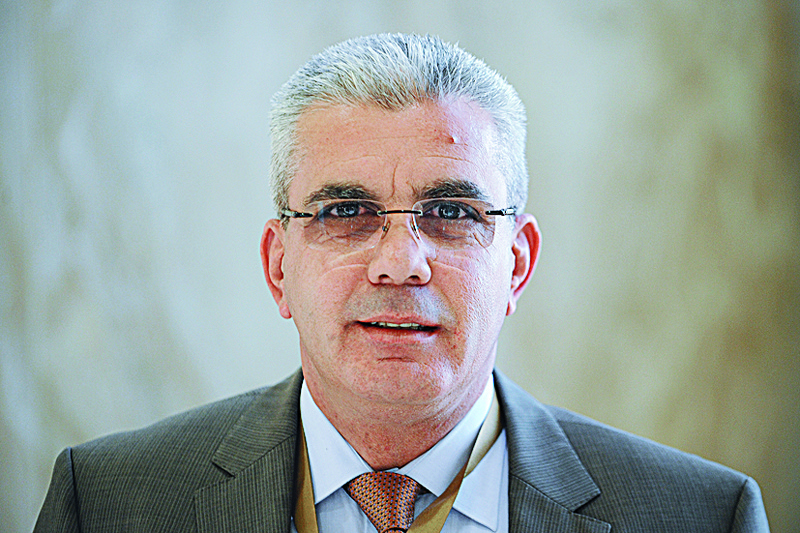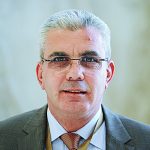By Ben Garcia
KUWAIT: Various Ambassadors in Kuwait were interviewed by Kuwait Times to know their local traditions and culture during Ramadan. We also ask about their current corona virus situations at their respective countries and how they are handling and reacting to this pandemic. The following are excerpts from Kuwait Times interview with Palestinian Ambassador to Kuwait Rami Tahboub:
Caught by surprise
Kuwait Times: What are your thoughts and views about this pandemic, seeing the current situation of both countries - Kuwait and Palestine?
Rami Tahboub: We were all caught by surprise by this pandemic. Who was ready and prepared for this plague? No one! But individual approach per country varies. In Kuwait, they are decisive and serious about the coronavirus and I congratulate Kuwait for being so protective of its population.
They implemented lockdowns and curfews to protect the entire country and they should be praised for doing so. Kuwait in general has been leading the fight in the region. Here they started vaccinations in December last year. They will vaccinate everyone and for free.
As for our country, we have been devastated by this virus. Vaccines arrived only a few days back, but we were already counting the deaths. By March 22, we have around 2,400 deaths and around 224,000 infected. This is a very sad part of the history of mankind and we will never forget it. Hopefully by summer, most Palestinians will be vaccinated to return to normal.
Kuwait Times: How will Ramadan celebrations differ this year?
Tahboub: Last year the pandemic was beginning when we celebrated Ramadan. Last Ramadan was difficult for everyone because people had no idea of this virus. We were all anxious and afraid. Last year we did not celebrate anything. It was strange for everyone. Kuwait has been celebrating Ramadan in a very unique way - it is festive with so much celebration. Kuwaitis meet people in diwaniyas, but this did not happen last year.
Kuwait has a warm and cozy atmosphere in Ramadan. I don't know what in store is for us this Ramadan, but maybe it will be the same as last year. The virus is still there and there is no indication yet that it will subside anytime soon. Maybe we will end up again watching TV and enjoying soap operas, but we all pray that this year will be the end of the pandemic.
Kuwait Times: Is your family with you?
Tahboub: Yes, they are all with me - my wife and two daughters. Thanks to Allah for His blessings and keeping us all safe. It is good that in a time like this we are all in one place. Kuwait has been a very good host country for the embassy of Palestine. The population is happy and contended here. This is the most important thing, that we are all satisfied and happy.
Kuwait Times: Usually ambassadors go back to Palestine for Eid - will you celebrate the end of fasting here?
Tahboub: If Ramadan falls in summer, I normally spend the first two weeks here in Kuwait and the rest in Palestine to wish and greet everyone there. Summer is also our vacation time, normally in June or July. If Ramadan falls in winter, I stay here, because children have classes, so I need to be with them. Also in the diplomatic community, we have a regular audience with HH the Amir on the third or fourth day of Ramadan, so I need to be here.
Kuwait Times: When was the first year of your assignment as ambassador of Palestine to Kuwait?
Tahboub: I came in 2013; I am now in my ninth year as Palestinian ambassador to Kuwait.
Kuwait Times: Do you organize activities for Ramadan for your community in Kuwait?
Tahboub: In normal times, we host several ghabqas for the Palestinian community. We also distribute awards and recognitions to the top 10 Palestinian students in Kuwait. We invite their families and friends and community leaders to celebrate their success with them. This will be the second year that we are not holding this event because of the pandemic.
We also organize charity events for the Palestinian people every year, especially members of the community who do not have enough money or face financial challenges to celebrate Ramadan. So we provide food and financial assistance to them. Normally, we support 150 to 200 Palestinian families. We have celebrations and parties, but they are all suspended now.
Before the pandemic
Kuwait Times: Can you take us back to how you spent Ramadan before the pandemic.
Tahboub: During those years, the work timings of everyone were shortened. At the embassy, we started work at 9 am and ended at 2 pm to give time to prepare for iftar. After that, if I was not invited to any events, I used to go home to my family. I treasure the time during this period to talk to them heart to heart. It's a time for family bonding and rest. I make sure to break the fast at home. After iftar, I normally visit diwaniyas. Wherever I go, I wish everyone a happy Ramadan. Then I used to go to ghabqas. Traffic during Ramadan is very heavy, but we all accept it.
Kuwait Times: What is special or unique that you see here during Ramadan?
Tahboub: I am fascinated with the Girgian tradition here in Kuwait, where kids visit your home and sing. It is special, as we don't have a similar activity for kids in Palestine. I miss this, as I like seeing kids happy and in a festive mood. I want to see kids coming and singing and asking for candies and nuts.
Kuwait Times: Do you cook? What is your favorite food?
Tahboub: No, I don't cook, but I eat (laughs). My wife cooks for the family - she is the best cook ever. My favorites among Palestinian foods are hummus and falafel. These are daily appetizers. I like lentil soup and zucchini stuffed with rice or meat. I like the chicken and sauces made by my wife, like chicken stuffed with rice and meat. I also like mutabbaq with cheese and nuts with syrup. I like almond juice or tamarind for drinks after consuming all these delicious dishes.
Kuwait Times: Do you pray five times a day?
Tahboub: Yes! If I am in Palestine, I normally visit the Al-Aqsa Mosque in Jerusalem for prayers - it has a special place in my heart. I am always blessed whenever I pray there. In Kuwait, I always pray at the mosque near our home. I also visit the Grand Mosque.




